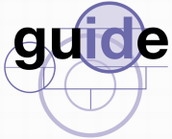
Project Code: IST-2003-507495(International)
Funding programme: IST
Funding Agency: European Commission
Project type: RTD
Web site: http://www.guide-project.org/
Starting date: 1 January 2004
Ending date: 30 June 2007
Total budget: 6,900,000 EUR
Scientific coordinator: Dr. Nancy Pouloudi
Project Manager: Dr. Elpida Prasopoulou
Contact: Dr. Elpida Prasopoulou
Groups: IRIS
Description
In today's information driven society, the government interface has become more and more critical to providing greater access and convenience to its citizens whilst enabling long-term cost reduction in times of reducing budgets. More and more citizens expect to be able to transact with their government through the interface of their choice and, increasingly, that choice is turning to the Internet. A report by the Joint Swedish Presidency and European Commission (IDA) came to the conclusion that eGovernment at a European level "is one of the most important tools in the shaping of a Union to serve both citizens and enterprises. It is not only concerned with making public services more accessible through electronic delivery,but is intimately linked with the possibilities for greater openness and citizens involvement and participation in the Union 'The challenge is that eGovernment requires more than simply transforming today's paper based forms into digital ones, but that front office and back office processes will undergo disruptive change. The re-design of back-office processes, an improved collaboration between different departments and the harmonization of eGovernment on a pan-European level, are drivers for which GUIDE's conceptual solutions are designed to meet. GUIDE will be based on research in the governance of networked organisations, eGovernment models, legal and socio-economic issues and setting of benchmarks and standards. GUIDE brings together and integrates the work of a critical mass of member state governments, commercial organisations, SMEs, research labs, academic experts and standards institutions across the member states, Mediterranean countries and newly independent states.
Identity is the guiding concept that this project will develop in a holistic way from its moral philosophical foundations to legal, technical and government process issues that allow its management in eGovernment. Identity is defined as all information associated with an individual; it is not just a token or digital certificate. Identity management, therefore, involves maintaining a person's complete information set, spanning multiple transactions and contexts, and establishing the relationship among various identities with the goal of improving data consistency, accuracy and data and systems security in an efficient manner. Identity management also includes the ability to authentication an individual and protect it from harm of misuse.
Through multi-disciplinary research into complex, adaptive systems and development of open platform specifications and harmonisation frameworks, GUIDE will enable dynamic collaboration and interaction between the citizen, business, and eGovernment. The GUIDE architecture and infrastructure will facilitate organisational networking, knowledge sharing and integration of processes across departments, organisations, eGovernments and countries, and in an efficient manner. Existing standards will form the basis for the eGovernment platforms, applications and multi-modal services. GUIDE will also support national, regional and local initiatives and deploy where possible open source software solutions for all aspects of inter- and intra-government operations. Additionally, it is envisaged that mass demonstration and deployment of GUIDE will enable one stop eGovernment services for all. Finally, through local development processes, including SMEs and their inter-actions with eGovernment, GUIDE will act as a driver for SME and government re-organisation. As outlined above it is expected that SMEs will benefit economically by reducing the cost of transactions with Governments and, for technology SMEs, reducing the barriers to entry in identity management services.

 Unless otherwise expressly stated, all original material on this page created by members of the ISTLab is licensed under a Creative Commons Attribution-Noncommercial-No Derivative Works 2.5 License.
Unless otherwise expressly stated, all original material on this page created by members of the ISTLab is licensed under a Creative Commons Attribution-Noncommercial-No Derivative Works 2.5 License.